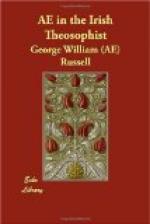express abstract ideas, they rarely indicate the particular
actions which would be capable of being suggested
by any mimicry possible to the human voice. I
have selected at random from a list of roots their
English equivalents, in order to show the character
of the roots and to make clearer the difficulty of
holding such views. The abstract nature of the
ideas, relating to actions and things which often
have no attendant sound in nature, will indicate what
I mean. What possible sounds could mimic the
sense of “to move, to shine, to gain, to flow,
to burn, to blow, to live, to possess, to cover, to
fall, to praise, to think”? In fact the
most abstract of all seem the most primitive for we
find them most fruitful in combination to for other
words. I hope to show this clearly later on.
It is unnecessary to discuss the claims of the interjectional
theory, as it is only a theory, and there are few
roots for which we could infer even a remote origin
of this nature. The great objection to the theory
that speech was originally a matter of convention
and mutual agreement, is the scarcity of words among
the roots which express the wants of primitive man.
As it is, a wisdom within or beyond the Aryan led
him to construct in these roots with their abstract
significance an ideal foundation from which a great
language could be developed. However as the exponents
of rival theories have demolished each other’s
arguments, without anyone having established a clear
case for himself, it is not necessary here to do more
than indicate these theories and how they may be met.
In putting forward a hypothesis more in accord with
the doctrine of the spiritual origin of man, and in
harmony with those occult ideas concerning speech
already quoted, I stand in a rather unusual position,
as I have to confess my ignorance of any of these primitive
languages. I am rather inclined however, to regard
this on the whole as an advantage for the following
reasons. I think primitive man (the early Aryan)
chose his words by a certain intuition which recognised
an innate correspondence between the thought and the
symbol. Para passu with the growing complexity
of civilization language lost it spiritual character,
“it fell into matter,” to use H.P.
Blavatsky’s expression; as the conventional
words necessary to define artificial products grew
in number, in the memory of these words the spontaneity
of speech was lost, and that faculty became atrophied
which enable man to arrange with psychic rapidity
ever new combinations of sounds to express emotion
and thought. Believing then that speech was
originally intuitive, and that it only need introspection
and a careful analysis of the sounds of the human
voice, to recover the faculty and correspondences
between these sounds and forces, colours, forms, etc.,
it will be seen why I do not regard my ignorance of
these languages as altogether a drawback. The
correspondences necessarily had to be evolved out




